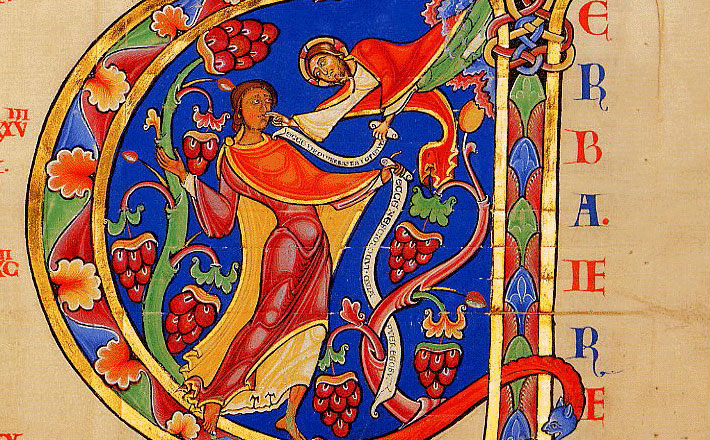Commentary on Exodus 3:1-15
Exodus 3 is simultaneously one of the best-known and most theologically confusing passages in all of the Old Testament.
Moses receives a divine visit from a burning bush, then God issues a call and promises deliverance for the enslaved Israelites. The passage forms a crucial bridge from the birth and younger years of Moses to his role as divine mediator. The details directly connect Moses as a successor to the patriarchs (verses 6, 15) and hint at the coming acts of God, who promises to deliver his people “out of Egypt” (verse 11).
The passage is filled with difficulties and unexplained details. My seasoned biblical scholar advice to the working preacher is to not seek to solve the ambiguities, but to name them and model admiration for these mysteries associated with theophany. We cannot read the Bible as an answer key to a math textbook. Rather, the Bible is a reflection of God’s word for us, so our human selves should expect mystery.
“The bush was blazing, yet it was not consumed” (Exodus 3:2)
The event was so supernatural that Moses was compelled to observe the burning bush that was not consumed. When was the last time you lit an actual fire? Weber grills do not count, and neither does the direct line gas fireplace in your home. Fires take a lot of fuel. The mystery was an ordinary bush with extraordinary properties—limitless fuel to sustain this fire. Similarly, God’s provision is endless.
“Here I am” (Exodus 3:4)
Moses did not seek God, but was just pasturing the flock (verse 1). God calls to Moses through the bush, and later with his voice. Moses responds appropriately, “Here I am.” God gives urgent directions to recognize the sacredness. Only afterwards, God identifies himself as the God of the patriarchs. And Moses acknowledges through covering his face. Moses did not wake up that day and decide that he would lead the Israelites out of their oppression back to the land of Canaan. That was God’s decision, but Moses responded to the unexpected call appropriately, at least through Exodus 3:4. Later in the chapter, a more human response of fear and uncertainty emerges.
“I know their sufferings” (Exodus 3:7)
God continues to speak, offering compassion in hearing the misery and the cries on account of oppression. The compassion is reiterated with the phrase “I know their sufferings” (verse 7). The enormous period of time from the patriarchs to Moses is only covered by a few verses, but God was there. And even though he was silent, God was neither distant nor detached. He had great compassion on the oppression that the people endured. And the burning bush informs our reading of the bold declaration of God that he will deliver the people into “a land flowing with milk and honey.” God will miraculously sustain the people just as he can sustain the bush. God then assures victory over the Canaanite polities, which is a bold proclamation for a landless and enslaved ethnic group within the orbit of one of the great Near Eastern empires.
“I will be with you” (Exodus 3:12)
These declarations were overwhelming for Moses, who then questions his status as the chosen leader. God does not assure Moses as leader because of his natural skill nor charisma. Rather, God assures Moses because God is faithful. Moses’ faults will not matter, as he is promised, “I will be with you” (verse 12). And if that assurance is not enough, God sends a sign to solidify Moses’ calling. The confidence is not in his own human abilities, but in the God who sends him.
“I AM WHO I AM” (Exodus 3:14)
This brings us to the greatest mystery. God gives a cryptic answer to Moses’ request for a name. When asked about the divine name, God responds, “I am who I am.” Anticipating confusion, God then explains, “Thus you shall say to the Israelites, ‘I AM sent me to you’” (verse 14). This is the kind of explanation that increases the confusion.
Before we get to the answer, we should question why Moses is still wanting answers beyond God’s straightforward declaration of his identity in verse 6. It is not entirely clear that Moses needed the name. The profession of protests from Moses suggests that he was more worried than anything. Although the earlier part of the passage portrays Moses in a posture of holiness and covering his face, the divine calling pushes Moses to the decidedly human actions of delay and stall.
But God knows that the heart of the question in “What is his name” is more of a plea for assurance or an expression of human fear. Here lies the mystery of “I am who I am.” In my younger days, this reminded me of Popeye (“I am what I am”). Nowadays, this reminds me of the phrase, “It is what it is” (which I still do not fully comprehend). Within biblical times, the name was deemed too holy to pronounce, so it was read as adonai or “Lord.” The JPS finds this name untranslatable and merely transliterates the Hebrew into “Ehyeh-Asher-Ehyeh.” Some just transliterate the letters as YHWH.
Whatever the precise understanding, the answer “I am who I am” is not just a declaration of a name, but assurance of God’s presence in the call. One possible explanation is that the phrase is technically a causative verbal form of “to be.” Thus, one awkward translation of verses 13b and 14a:
“What shall I say to them?”
God said to Moses, “I am the one who causes things to pass.”
This answers the heart of Moses’ question. Moses does not want the name. More than that, he wants assurance that God will do this. So the answer is right—that he is the one who will cause things to pass. Despite the objections, God will deliver on his promises. He is the God of the patriarchs. God will deliver on his promise of redemption. Like the name, how God does it will be a mystery. But we can hold on to the knowledge that God will continue to cause things to pass for the ages (verse 15).


August 30, 2020